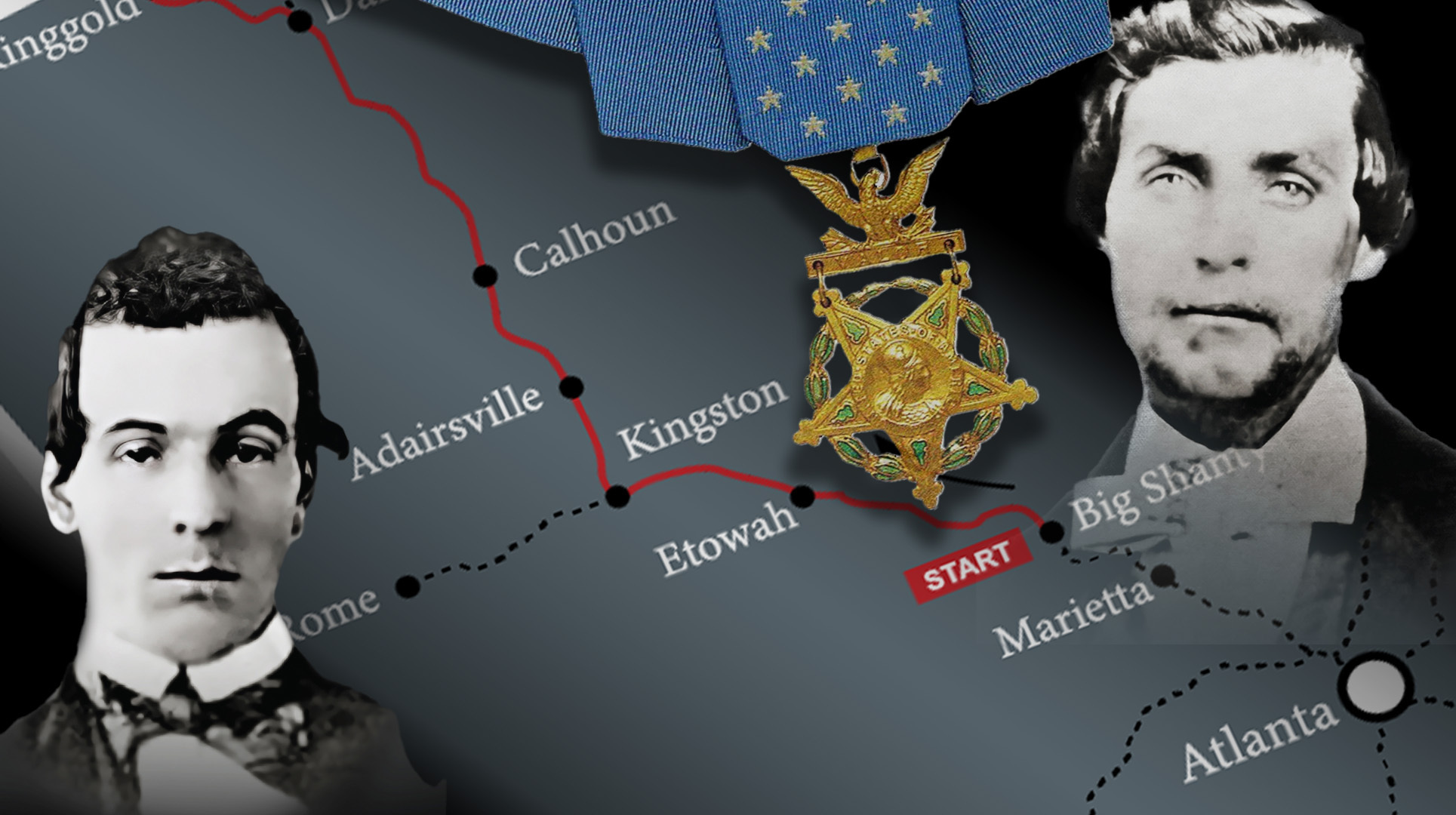

Two Ohio soldiers who stole a Confederate train and left a 200-mile trail of havoc through the South will posthumously receive the Medal of Honor on Wednesday. Pvt. Philip G. Shadrach and Pvt. George D. Wilson were two members of a team of Union soldiers who were captured and executed after taking part in a daring Civil War mission behind enemy lines that came to be known as ‘the Great Locomotive Chase.’
The men were part of a covert team sent to disrupt the Confederacy’s railroad system in April 1862. At the time, they were assigned to the 2nd Ohio Volunteer Infantry Regiment.
Wilson and Shadrach both distinguished themselves beyond the call of duty, according to their Medal of Honor citations, which also praised their “gallant actions in close contact with the enemy.”
Twenty-two Union soldiers and two civilians led by James J. Andrews – a spy from Kentucky – embarked on a raid to destroy Confederate railways and telegraph lines from Georgia to Tennessee. Their audacious plan was to travel hundreds of miles into Confederate territory to meet outside Marietta, Georgia to commandeer a train engine that they named the General and headed out to Chattanooga, tearing up tracks, destroying bridges, and cutting the telegraph along roughly 200 miles.
The group, who came to be known as Andrew’s Raiders, was slowed by having to stop for oncoming trains on the single-track railway and eventually had to flee from their pursuers about 18 miles short of Chattanooga. Within 12 days, they were all captured. On June 18, 1862, Wilson and Shadrach were among the seven of the raiders who were hanged as spies. Andrews was hanged separately 11 days earlier.
Subscribe to Task & Purpose today. Get the latest military news and culture in your inbox daily.
Wilson’s great-great granddaughter Theresa Chandler told reporters on Tuesday that she wished that young Americans could learn more about what Andrews’ raiders went through.
Chandler’s voice broke as she talked about how her great-great grandfather’s last words before being hanged were about how he was willing to fight for his country and he had no ill will toward Southerners.
“Sorry for being so emotional, but it touches deeply,” Chandler said at a media roundtable.
Nineteen of the 22 Union soldiers who took part in the raid became the first U.S. soldiers to receive the Medal of Honor, said Brad Quinlin, a historian based in Georgia. One soldier declined the award when offered it because he was captured early in the operation.
Shadrach and Wilson were part of every aspect of the mission, Quinlin told Task & Purpose. It’s unclear why they were not initially awarded the Medal of Honor along with the other soldiers who participated in the operation, he said.
The Civil War was quite chaotic at the time, he said. Some of the raiders escaped and the rest were later freed in a prisoner exchange. The 2nd Ohio Volunteer Infantry Regiment took such heavy casualties at the Battle of Chickamauga in 1863 that it was folded into another unit and many of the regiment’s original officers were promoted and posted elsewhere.
“So, there was just nobody there to stand up for them for a length of time,” Quinlin said. “It does happen, and with events after the war, there was such chaos – it took until the 1880s for families to get notification of what happened to their loved ones during the war itself. So, you can imagine: These two men were just overlooked.”
In 2012, Quinlin was asked by one of Shadrach’s relatives to help get both men awarded the Medal of Honor. Over the next 12 years, Quinlin submitted 26 awards packets until he recently heard from the White House that the two men would finally be recognized for their heroism 162 years after their deaths.
After so many years, the award represents resolution for both Wilson and Shadrach’s families, Quinlin said.
“I volunteer at the Medal of Honor Heritage Center in Chattanooga,” Quinlin said. I can’t tell you how many times I’ve stood in front of these graves and the graves of their comrades and seen the Medal of Honor insignia on the other Union soldiers but not on Philip’s and George’s graves. It’s been a process. New friendships have been built – lifelong friendships with the families. And yesterday, as we met for interviews with the press, there were a lot of tears shed as we all realized that at 4:45 this afternoon in the White House, these two men will stand with their comrades as Medal of Honor recipients.”
The latest on Task & Purpose
- Marines revive historic ‘Sledge’ airfield on Peleliu in Pacific pivot
- Carrier USS Nimitz back at sea following months of maintenance
- Air Force special operations squadron commander fired after arrest
- Naval and Air Force Academies welcome class of 2028 with ‘I-Day,’ plenty of yelling
- Top general in ISIS fight’s advice to junior officers: Be ‘humble enough to listen’
